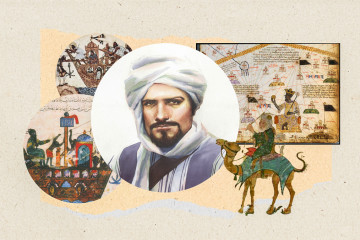
Was Ibn Battuta the greatest explorer of all time?

Travel is an essential part of our rights and freedoms, and it's great to have the opportunity to indulge in it once more. When it comes to historical travel and exploration, many people think of Marco Polo as the most famous adventurer. However, Ibn Battuta, an Islamic scholar, actually travelled to even more places than Marco Polo.
Over a period of almost thirty years, he journeyed through the Islamic world, India, China, Southeast Asia, and the Horn of Africa. His incredible voyage covered an impressive 75,000 miles (120,000 km).
"Ibn Battuta is renowned for his extensive travels spanning over 75,000 miles within and beyond the Islamic realm"
Ibn Battuta is an exceptional traveller in pre-modern history. He explored different countries by crossing oceans and travelling with camel caravans, covering over 40 contemporary countries on foot. Despite risking his safety to satisfy his love for adventure, he gained recognition as the most prominent explorer of his time.
Born in Morocco, his birth name was Abu Abdullah Muhammad ibn Battuta, and he lived in the 14th century.
Starting from his birthplace in Tangier, Morocco, in 1325, Ibn Battuta embarked on a significant journey that lasted almost thirty years. He travelled through a range of terrains across Africa, the Middle East, Central Asia, India, Southeast Asia, and China. While his initial motivation was the Hajj pilgrimage to Mecca, his expeditions surpassed this goal. He explored various cultures, and societies, and documented his observations.
— The New Arab (@The_NewArab) July 29, 2023 |
Ibn Battuta is renowned for his extensive travels spanning over 75,000 miles within and beyond the Islamic realm. The renowned travelogue of Ibn Battuta, titled "Rihla" — "journey" in Arabic — documents his many travels across Africa, the Middle East, and Asia.
Originally called "Tuhfat Al-Anzar fi Gharaaib Al-Amsar wa Ajaaib Al-Asfar" or "A Gift for Those Who Contemplate the Wonders of Cities and the Marvels of Travel," this compilation provides a valuable historical account of the societies he encountered along the way.
Ibn Battuta had an education in Islamic law, but his true passion was for adventure. When he was 21 years old, he set out on his journey in 1325, beginning with the Hajj pilgrimage. The pilgrimage lasted for an astonishing 16 months, but Ibn Battuta's thirst for exploration only grew stronger after it was over.
Ibn Battuta travelled with caravans to reduce risks and wrote about his experiences, including battles, shipwrecks, and uprisings, providing insight into medieval Islamic history.
He sailed through the Red Sea towards Mecca and travelled through the vast Arabian desert. After that, he crossed Iraq and Iran. Later in 1330, he embarked on another journey through the Red Sea and continued on to Tanzania via Aden.
In 1332, Ibn Battuta decided to explore India and passed through Khwarizm, Bukhara, and Afghanistan before finally reaching the Muslim territory of Delhi. He sailed through the Red Sea towards Mecca and travelled through the vast Arabian desert.
After that, he crossed Iraq and Iran. Later in 1330, he embarked on another journey through the Red Sea and continued on to Tanzania via Aden. In 1332, Ibn Battuta decided to explore India and passed through Khwarizm, Bukhara, and Afghanistan before finally reaching the Muslim territory of Delhi.
— Paul Williams (@freemonotheist) March 27, 2023 |
After being welcomed by the Sultan of Delhi, he was selected as a judge and spent approximately eight years in the Indian subcontinent before embarking on another expedition.
In 1345, he arrived in Quanzhou, China, beginning his travels in China. During his journey, he visited various cities such as Beijing, Hangzhou, and Guangzhou. He also explored the Great Canal, admired the Great Wall, and interacted with the Mongol Khan who was in power at the time.
Battuta's journey took a significant turn when he arrived in China. After exploring the farthest corners of the world, he retraced his steps back home to Morocco in 1349. Since his parents had passed away, he stayed there only briefly before travelling to Spain. He embarked on a multi-year trip that involved crossing the Sahara desert and reaching the Malian Empire, culminating in his visit to Timbuktu.
During his travels, he faced many dangers, including attacks by bandits, almost drowning, and encountering oppressive rulers. In 1355, he finally returned to his home in Tangier, Morocco, for good. Although he didn't keep a personal journal during his expeditions, he was asked by Sultan Abu Inan to write about his adventures. He spent over a year recounting his experiences to a scribe named Ibn Juzayy.
It is believed that after finishing his "Rihla," Ibn Battuta worked as a judge in Morocco for a few years before his death in approximately 1368. Upon the request of Sultan Abu Inan, he began recording his travels. Alongside Ibn Juzayy, he spent a year narrating and documenting his journeys, creating a priceless historical record.
Dr Ufuk Necat Tasci is a political analyst, academic, and journalist. His research areas and interests include Libya, the foreign policy of Turkey, proxy wars, surrogate warfare, and new forms of conflict and history
Follow him on Twitter: @UfukNecat


